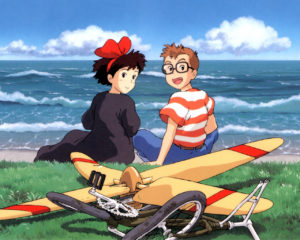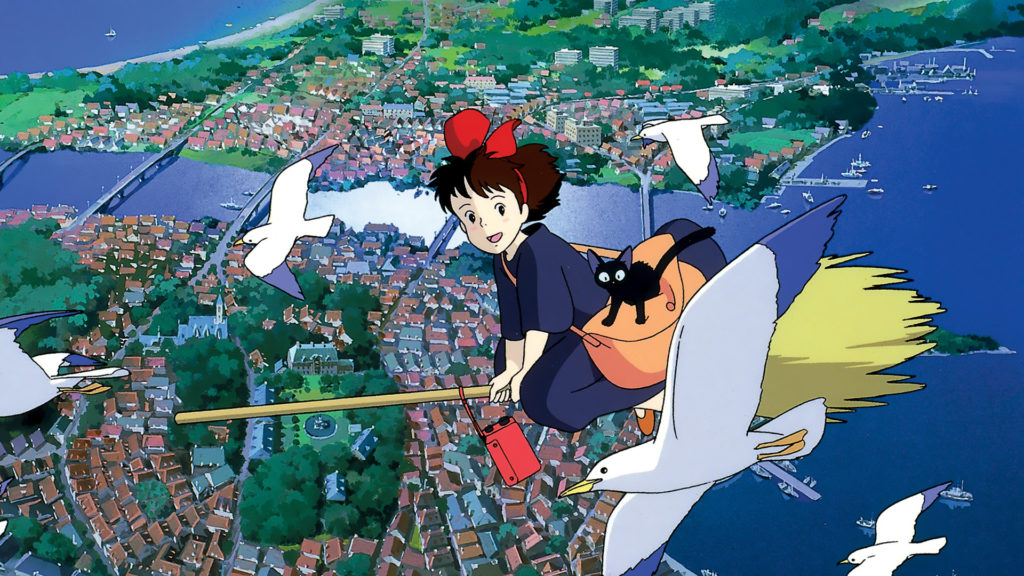I think Studio Ghibli’s greatest strength lies in its ability to have something that initially feels like there really isn’t any story there, and make it so that you can connect with the characters on such a level where you can feel their hardships; even if the character happens to be a witch who is terrible at making potions, casting spells, and generally being a witch. The writing prowess of the Studio Ghibli staff makes this relation seem completely conventional, in that even though I have nothing in common with the character on-screen, given the bizarre circumstances of their lives I can still put myself in their position regardless of how ludicrous their position is. This is a pretty common characteristic of the Studio Ghibli filmography. It’s one we’ve come to know and love and seems to transcend the basic nature of the plots and the over-the-top nature of the circumstances. Anyway, back to Kiki.
“Kiki’s Delivery’s Service” is a sweet little film that got its original release in Japan back in 1989. You wouldn’t be able to tell given the quality of the breathtaking animation, but that’s for later on. Kiki is a young witch who isn’t that good at being, well, a witch. She can’t make potions, she can’t cast spells, but the one thing she can do is fly to her heart’s content. She leaves her family in order to find a town where they don’t have a witch with her sarcastic pet cat Jiji. They’re the only ones with onomatopoeic names so at least this review won’t drive me up the wall. I would also like to point out how happy I am to write the phrase “sarcastic pet cat” and be completely serious, but such is the nature of the beast when dealing with Studio Ghibli.
 Kiki comes across a town named Kokiro, which oddly enough looks more like a European town than anything else but still,Kokiro doesn’t have a witch and Kiki sees her opportunity. She sets up shop as a courier, working out of a bakery. You see what I mean when I say ludicrous circumstances. She is initially dealing with a boy by the name of Tombo and this develops into a nice, adorable, slightly clichéd, relationship of sorts. This is based on a mutual love of flying with Tombo and his being infatuated with Kiki’s ability. This dynamic between Kiki and Tombo, as well as a number of supporting characters, drive the plot forward for a very pleasant piece.
Kiki comes across a town named Kokiro, which oddly enough looks more like a European town than anything else but still,Kokiro doesn’t have a witch and Kiki sees her opportunity. She sets up shop as a courier, working out of a bakery. You see what I mean when I say ludicrous circumstances. She is initially dealing with a boy by the name of Tombo and this develops into a nice, adorable, slightly clichéd, relationship of sorts. This is based on a mutual love of flying with Tombo and his being infatuated with Kiki’s ability. This dynamic between Kiki and Tombo, as well as a number of supporting characters, drive the plot forward for a very pleasant piece.
Let’s get the obvious out of the way early. The animation is absolutely, positively, categorically, unquestionably, adjectively stunning. I expect nothing less from the animation masters themselves at Studio Ghibli. Seriously, all their films are sinfully astonishing when it comes to how they look and this is no exception. Whether it’s a bird way off in the horizon or a massive set piece crashing to the Earth, everything looks like hundreds of man-hours went in to creating every stroke of a pencil and every dash of colour. The movement is as seamless as a ballet and one questions how the animators even get their characters to move like that.
 The animation is just one side to this little gem. The characters feel right at home in such a surreal piece and every one of them feels real and fluent. The relationship between Jiji and Kiki is an odd one; it’s really the only thing that bothered me about the film. I feel as if Jiji could have been taken out and it wouldn’t have made a difference. I mean, don’t get me wrong, his sarcastic, whimsical nature is entertaining, but I believe he struggles for relevancy in an already packed film. That’s not to say the same for Tombo, who feels like the glue that holds the ridiculous and the grounded in such a fashion that makes it entertaining to watch him endlessly follow his heart to try and be with Kiki. Kiki herself is another home run for Ghibli. Given the most basic of story-arcs, Kiki comes out from one end of the film to the other with such bravado that you will believe that Kokiro is about to get the best damn witch that’s ever flown a broom.
The animation is just one side to this little gem. The characters feel right at home in such a surreal piece and every one of them feels real and fluent. The relationship between Jiji and Kiki is an odd one; it’s really the only thing that bothered me about the film. I feel as if Jiji could have been taken out and it wouldn’t have made a difference. I mean, don’t get me wrong, his sarcastic, whimsical nature is entertaining, but I believe he struggles for relevancy in an already packed film. That’s not to say the same for Tombo, who feels like the glue that holds the ridiculous and the grounded in such a fashion that makes it entertaining to watch him endlessly follow his heart to try and be with Kiki. Kiki herself is another home run for Ghibli. Given the most basic of story-arcs, Kiki comes out from one end of the film to the other with such bravado that you will believe that Kokiro is about to get the best damn witch that’s ever flown a broom.
“Kiki’s Delivery Service” is a great addition to Studio Ghibli’s collection of masterpieces and serves as a great example of less is more.
– by Paul O’Connor


